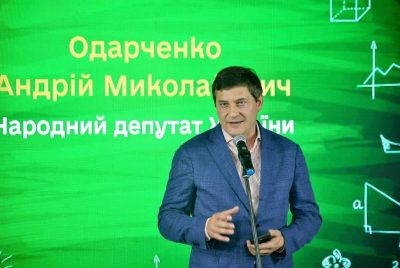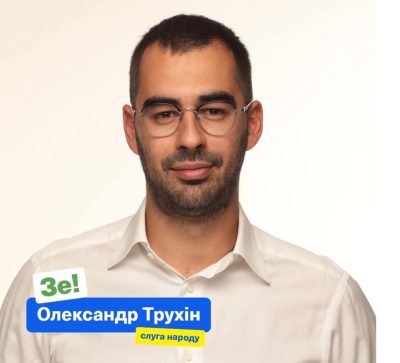

Ukrainians are still waiting for corruption convictions, or at least they think they are. What often goes unnoticed is that many such verdicts have already been delivered. And not just for judges, prosecutors, or heads of state-owned enterprises, but also for some of the most brazen top officials, including Members of Parliament.
This last category deserves special attention: after all, we’re talking about top-tier politicians handpicked by the people — politicians who earned that support through charming, lofty promises.
According to statistics, the High Anti-Corruption Court has issued more than a dozen corruption convictions against MPs. And each one serves as a reminder of just how empty campaign promises can be when it comes to our future lawmakers. Most ironically, during their campaigns, nearly every second MP on this dishonorable list pledged to eliminate corruption and hold greedy officials accountable.
We’ve compiled a selection of stories featuring these once-hopeful people’s deputies, now convicted of corruption, and looked back at what they told voters during their campaigns. Spoiler alert: every single one of them, in one way or another, promised to root out the very shameful phenomenon they themselves ended up embodying.
We’ve compiled a selection of stories featuring these once-hopeful people's deputies, now convicted of corruption, and looked back at what they told voters during their campaigns. Spoiler alert: every single one of them, in one way or another, promised to root out the very shameful phenomenon they themselves ended up embodying.
Andrii Tkachuk
To defeat corruption, you first have to lead it
Anatolii Hunko Photo credit: Anatolii Hunko’s Facebook page
“Failed reforms, incompetent officials, total political corruption have led to a significant decline in the socio-economic well-being of the population over the past five years,” — that’s how the thunderous election manifesto of MP Anatolii Hunko begins. The same Hunko who, in March this year, was sentenced by the HACC to seven years in prison with confiscation of property. Sure, the verdict hasn’t entered into force yet (he’s appealing), but the symbolism is hard to ignore.
In 2023, Hunko was caught red-handed receiving an $85,000 bribe for granting use of 1,700 hectares of state-owned land belonging to the National Academy of Agrarian Sciences of Ukraine (NAAS). And that was only a down payment — the full bribe he allegedly sought totaled $221,000. But the real plot twist? At the very same time he was pocketing bribes for land deals, Hunko was chairing a parliamentary temporary investigative commission, dedicated, no less, to uncovering corruption at NAAS.
It’s hardly surprising that Hunko was tripped up by land-related corruption. That was, after all, one of his campaign centrepieces back in 2019. He promised voters to increase income from land shares and to cleanse the system by firing corrupt officials.
It’s hardly surprising that Hunko was tripped up by land-related corruption. That was, after all, one of his campaign centrepieces back in 2019. He promised voters to increase income from land shares and to cleanse the system by firing corrupt officials.
Andrii Tkachuk
Odarchenko’s digital bribe
Andrii Odarchenko Photo credit: Andrii Odarchenko’s Facebook page
MP Andrii Odarchenko, a member of the Verkhovna Rada’s Anti-Corruption Committee, can now be considered something of an innovator among Ukraine’s top corruption suspects. He was caught attempting to bribe the former head of the State Agency for Recovery, Mustafa Nayyem. But not with old-fashioned cash, Odarchenko offered his bribe in cryptocurrency, making it the first officially recorded crypto-bribe in the country. What was he after? Preferential access to state funding for repairs at the State Biotechnological University, where he had previously served as rector. In a twisted way, one could argue he was staying true to his campaign promises. After all, he did pledge to digitize voting and simplify access to education. Just perhaps not through blockchain-based bribery schemes.
To be fair, Odarchenko may have left voters one honest disclaimer right at the start of his election manifesto: “The old system of power, the system of corruption, lies, and lawlessness, does not want and is not capable of change.”
In the same manifesto, he promised to “hold officials accountable for unlawful enrichment” and, even better, to “increase penalties for corruption offenses, including the mandatory confiscation of property from the corrupt.”
While the court didn’t impose confiscation in his case, the High Anti-Corruption Court did hand him a solid eight-year prison sentence. The verdict hasn’t taken effect yet. It’s still under review by the Appeals Chamber.
But not with old-fashioned cash, Odarchenko offered his bribe in cryptocurrency, making it the first officially recorded crypto-bribe in the country. What was he after? Preferential access to state funding for repairs at the State Biotechnological University, where he had previously served as rector. In a twisted way, one could argue he was staying true to his campaign promises. After all, he did pledge to digitize voting and simplify access to education.
Andrii Tkachuk
Trukhin: a bribe on the highway of promises
Oleksandr Trukhin. Photo credit: Oleksandr Trukhin’s Facebook page
MP Oleksandr Trukhin couldn’t agree more with his colleague’s observation about the “old system of power and corruption” being unwilling and unable to change. In fact, he built his entire election campaign around the construction and repair of roads.
Ironically, it was this very promise that came back to haunt him. In 2021, a traffic accident involving Trukhin occurred on the freshly renovated Boryspil highway. The crash left six people injured and three cars damaged. Trying to quietly exit the scene, Trukhin helpfully offered the police officer a 150,000 UAH bribe, whispering the now-infamous phrase: “Let me just slip quietly into the woods.”
In his election campaign, Trukhin also promised to clean up and reboot Ukraine’s anti-corruption agencies. Sadly, he didn’t get the chance — though, to be fair, he did get very well acquainted with them. In February 2023, he signed a plea agreement admitting guilt, and the HACC handed down a final sentence: a UAH 68,000 fine and an obligation to donate UAH 6 million to Ukraine’s Armed Forces.
In his election campaign, Trukhin also promised to clean up and reboot Ukraine’s anti-corruption agencies. In February 2023, he signed a plea agreement admitting guilt, and the HACC handed down a final sentence.
Andrii Tkachuk
Onyshchenko’s double standards
Oleksandr Onyshchenko. Photo credit: Oleksandr Onyshchenko’s Facebook page
Oleksandr Onyshchenko has quite the reputation. Ukrainian society mainly remembers him as the mastermind behind the notorious “gas scheme” that bears his name.
Back in 2012, when he was first elected to Parliament under the banner of the Party of Regions, Onyshchenko dazzled voters with promises of “minimizing conditions for corruption,” “citizen oversight of officials,” “political accountability,” and even “European integration.”
And yet, barely a year later, in 2013, he allegedly launched a large-scale corruption scheme involving the procurement of state-owned gas through shell companies at below-market prices, and its resale at full market rates. Over three years, the state lost UAH 740 million in revenue from gas sales and another 2 billion in unpaid taxes and debt.
Onyshchenko had solemnly declared in his campaign manifesto that “the interests of citizens must take precedence over those of the state.” In practice, it seems he chose to place just one interest above all others — his own.
When the time came to take responsibility before society, Onyshchenko opted for a familiar route: in 2016, he fled abroad. In April 2024, the HACC found him guilty in absentia on all charges and handed down the maximum sentence — 15 years in prison and full confiscation of property. However, the Appeals Chamber recently overturned the conviction on mostly procedural grounds and sent the case back for retrial.
Onyshchenko had solemnly declared in his campaign manifesto that “the interests of citizens must take precedence over those of the state.” In practice, it seems he chose to place just one interest above all others — his own. When the time came to take responsibility before society, Onyshchenko opted for a familiar route: in 2016, he fled abroad.
Andrii Tkachuk
The boomerang of illicit enrichment
Iryna Kormyshkina. Photo credit: Iryna Kormyshkina’s Facebook page
MP Iryna Kormyshkina (née Allahverdiieva) ran for Parliament in 2019 on a wave of her party’s catchy slogans, promising, among other things, to “reinstate accountability for illicit enrichment” and “introduce mandatory confiscation of corrupt officials’ assets.”
Well, mission partially accomplished: accountability for illicit enrichment was indeed restored after its repeal in 2019, and property confiscation is now possible as part of plea deals. What Kormyshkina probably didn’t expect was that these noble reforms would circle back and hit her squarely in the face.
According to case materials, she illicitly enriched herself by 20 million UAH during 2021–2022. In March of this year, the MP pleaded fully guilty and signed a plea agreement with the prosecution. The HACC handed down a final sentence of five years (suspended), a 68,000 UAH fine, and an obligation to reimburse the state budget the full 20 million UAH, plus an additional 2 million to be donated to Ukraine’s Armed Forces.
Here’s the twist: since 2024, Ukrainian law allows the confiscation of corrupt officials’ assets even when they receive a suspended sentence — exactly the kind of scenario Kormyshkina found herself in. She personally supported this very provision in Parliament. Of course, when it came to her own plea deal, she conveniently left out any mention of confiscation. It turns out slogans are easier to vote for than to live by, especially when your own property is on the line.
***
All these examples vividly illustrate just how wide the gulf can be between a campaign promise and a public servant’s real-life behavior. Despite loud pledges to fight corruption and clean up the system, these MPs managed to find themselves right in the thick of corruption scandals.
At the same time, their stories also show that Ukraine’s anti-corruption system is increasingly capable of holding even high-ranking, politically connected figures to account.
Future politicians might want to keep that in mind before pledging integrity they’re not prepared to practice. And voters, for their part, would do well to stay alert, because behind the soaring rhetoric, disgraceful deeds may be just a bribe away.
Ukraine’s anti-corruption system is increasingly capable of holding even high-ranking, politically connected figures to account. Future politicians might want to keep that in mind before pledging integrity they’re not prepared to practice.
Andrii Tkachuk











